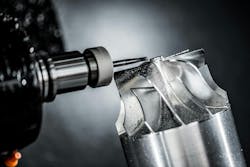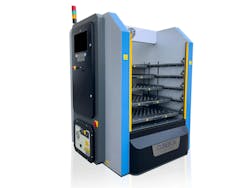Key Trends in Manufacturing Shaping the Future of Metalworking in 2024
The rise of smart factories, digitalized CNC machining, and the industrial metaverse are set to reshape the manufacturing landscape in 2024. Here, Hakan Aydogdu, general manager of CNC automation system manufacturer, Tezmaksan Robot Technologies, looks at the key trends in manufacturing and explores why manufacturers should embrace transformative technologies with user-friendly interfaces and adaptability to keep up with the evolving needs of the metalworking industry.
“As of July 2023,” according to Deloitte’s latest report on the U.S. manufacturing industry, “annual construction spending in manufacturing stands at $201 billion, representing a 70% year-over-year increase and setting the stage for further industry growth in 2024.”
The continued growth of the metalworking industry is driven by several factors. One is the rising demand for lightweight, strong, and durable materials like aluminum or titanium, particularly in the aerospace and automotive industries where these materials support energy efficiency. Manufacturers will also seek to invest more in electrification and decarbonization, in general.
Another driving factor is new technological advancements as, according to Aptean’s Discrete and Process Manufacturing: 2024 Trends and Outlook for North America report, manufacturers “focus on innovation/R&D, product development” to diversify into new markets and “acquire new customers.”
But what are the core technologies that will underpin the continued growth of the metal fabrication industry in the new year? Let’s look at some examples of systems and processes that manufacturers should embrace to stay competitive.
Artificial Intelligence (AI) and Machine Learning (ML)
In 2024, the metalworking and machine shop landscape will witness a profound shift, with Artificial Intelligence (AI) and Machine Learning (ML) emerging as critical trends. AI-driven product design tools are becoming integral to the industry, as they facilitate the creation of intricate and precise components. Meanwhile, ML algorithms are adept at analyzing vast datasets, enabling data-driven decision-making that enhances overall productivity. Both technologies enhance efficiency and competitiveness within the industry.
Analysis by Deloitte reveals that 86% of manufacturing executives believe smart factories will be primary drivers of competitiveness in the next five years. As soon as 2024, smart factories are poised to be pivotal in the metalworking and machine shop sector, integrating advanced interconnected technologies such as AI, 5G, Internet of Things (IoT), data analytics, and cloud computing.
As these machines become more interconnected and automated, so too will digitalized CNC machines, leading to increased efficiency and productivity.
For instance, predictive maintenance within smart factories uses AI algorithms to forecast equipment malfunctions, minimizing downtime and optimizing machine performance. The implementation of 5G ensures seamless communication between devices, facilitating quicker decision-making and response times. IoT sensors collect and transmit real-time data, allowing manufacturers to monitor and optimize production processes remotely. Furthermore, cloud computing enables the storage and analysis of vast datasets, fostering data-driven decision-making for improved productivity.
Digital Twins
The idea of the metaverse once belonged only in science fiction, a concept of the Internet as a single, universal, and immersive virtual world accessed through virtual reality (VR) and augmented reality (AR) headsets. This has been changing in recent years, as digital twins—where real-world objects or systems are replicated digitally and virtually—allow manufacturers to create immersive 3D environments and simulate equipment, processes, and other assets to support better safer, and more profitable decision-making in the real world.
In 2024, manufacturers are set to take the digital twins concept to another level. This will combine the 3D modeling, 3D scanning, and immersive environments with the data analytics, cloud computing, and IoT technologies of smart factories to create larger metaverses that replicate real machines and factories, buildings and cities, grids, transportation systems, and more in a virtual world. By establishing model-based enterprises, manufacturers can foster global connectivity and collaboration with internal and external stakeholders.
Forbes predicts that industrial metaverses will foster more immersive and collaborative working processes. While, in the 2023 Deloitte and MLC industrial metaverse study, an overwhelming 92% of manufacturers are actively experimenting with metaverse initiatives, projecting a substantial increase in sales, quality, throughput, labor productivity, and more.
Interconnected Technologies
Digitalized CNC machining is another anticipated trend for 2024, as machines become more automated and interconnected to increase efficiency and productivity in metalworking processes. To facilitate this, IoT sensors and devices and data analysis will become more integrated into control systems.
Elsewhere, the July 2023 AI Pulse Survey by Forrester found that manufacturers are growing more intrigued by the potential of AI tools, such as ChatGPT, to generate code for CNC machines. 67% of enterprises researched by Forrester indicated they are bringing generative AI into their overall AI strategy. Although 29% described their company’s use of generative AI as “experimentation”, which suggests many enterprises are proceeding with caution for now.
Nevertheless, the survey suggests manufacturers’ minds are turning more towards the possibilities of more integrated machinery on the shop floor. A further example of this is the CubeBOX system, a compact robot cell designed to operate up to three CNC machines continuously, addressing the industry's demand for increased efficiency and productivity. The system operates without downtime during loading and unloading, providing a seamless and uninterrupted 24-hour production cycle.
One of CubeBOX's key advantages is its user-friendly software, ROBOCAM, which eliminates the need for robot programming and CAM knowledge. This aligns with the industry's call for simplified processes and enhanced automation. The software converts 2D CAD drawings of workpieces to CAM, streamlining the integration process and allowing operators to focus solely on loading and unloading the workstation.
CubeBOX's lean and flexible design, coupled with the ability to handle various models and adapt to different CNC machines, addresses the industry's need for versatility. The system's compatibility with all CNC machines and control units, as well as its adaptability to different robot brands, positions it as a versatile and adaptable solution for manufacturers with diverse Industry 4.0 needs.
In the context of the challenges outlined for 2024, CubeBOX excels in reducing operator intervention and improving night shift efficiency. The system's capacity to run continuously for 24 hours enhances overall production output, aligning with the industry's goals of reducing lead times and optimizing efficiency. By automating the loading and unloading processes, CubeBOX minimizes downtime and contributes to predictive maintenance and digitalized CNC machining, integrating seamlessly with the vision of interconnected technologies in smart factories.
In conclusion, manufacturers must stay on top of current technological trends to address the challenges faced by the metalworking industry in 2024. Ideas once confined to the pages of science-fiction, like AI and the metaverse, must be embraced with an open mind, and combined with practical Industry 4.0 approaches to interconnecting machines on the shop floor. Such strategies will be essential if manufacturers are to stay competitive in 2024’s rapidly evolving industrial landscape.
If you are interested in improving your manufacturing efficiency and would like to learn more about CubeBOX automation systems, visit the Tezmaksan website.
Tezmaksan is a European robotics, machine tools, and industrial equipment company that dates back to 1981. Tezmaksan manufactures in-house in Europe and distribute its offerings such as CNC machines, machining centers, lathes, milling machines, and more. For further information please visit www.tezmaksan.com

